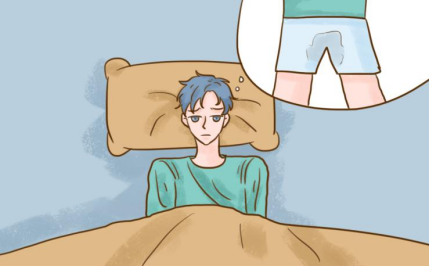Nightfall, also known as nocturnal emission, is a natural physiological process that occurs primarily in males, though it can also happen in females. It is characterized by the involuntary release of semen during sleep, often accompanied by dreams of a sexual nature. This phenomenon can raise concerns for many, particularly among young individuals or those unfamiliar with the body’s natural processes. In this article, we will dive deep into the causes of nightfall, its impact on health, and various remedies that can help manage or alleviate its frequency.
What is Nightfall?
Nightfall, medically termed nocturnal emission, refers to the involuntary release of semen during sleep. Typically occurring in males, nightfall can also occur in females, though it is less commonly discussed. It is considered a normal part of sexual maturation, particularly in adolescents and young adults. During nightfall, individuals may experience sexual dreams, known as erotic dreams or wet dreams, leading to ejaculation or vaginal lubrication in females.
The occurrence of nightfall is not restricted to a particular age group, although it is most frequent in younger males during puberty. This phase marks an increase in hormone production, leading to heightened sexual arousal, which can manifest as nocturnal emissions.
How Common is Nightfall
Nightfall is a widespread phenomenon, particularly during adolescence and early adulthood. Research suggests that nearly 83% of males experience nightfall at some point in their lives. The frequency of nightfall can vary based on factors like age, lifestyle, and overall health. Some may experience it frequently, while others may only experience it occasionally.
Females, although less studied, can also experience nocturnal emissions, though these may not always result in obvious physical evidence, such as in males.
The Biological Process Behind Nightfall
Nightfall is linked to the body’s natural response to sexual arousal, which is driven by the brain’s processing of sexual stimuli. During sleep, especially in the REM (Rapid Eye Movement) stage, the brain becomes more active, potentially triggering arousing thoughts or dreams. This can cause the body to respond by increasing blood flow to the genital area, leading to an erection in males and, ultimately, ejaculation.
For females, the process may involve vaginal lubrication or other sexual responses. While the exact physiological mechanisms for females remain less researched, the response is believed to be parallel to the arousal experienced by males.
Is Nightfall Normal?
Yes, nightfall is a normal and natural process. It signifies that the reproductive system is functioning correctly. Many young individuals worry about its occurrence, believing it may signal an underlying health issue. However, nightfall, particularly during adolescence, is merely a sign of the body’s hormonal shifts and sexual maturity.
Although nightfall tends to decrease in frequency with age, it can still occur in older individuals. In fact, nightfall can be seen as the body’s way of self-regulating by releasing excess semen, especially in the absence of regular sexual activity.
Causes of Nightfall
Several factors contribute to the occurrence of nightfall. These can range from biological processes to psychological factors, making it a multi-dimensional issue.
-
Hormonal Fluctuations
During puberty, the body experiences a surge in hormones like testosterone, which increases sexual desire and arousal. These hormonal shifts are one of the primary causes of nightfall in adolescent boys and young men.
-
Sexual Thoughts and Dreams
Engaging in sexual thoughts or fantasies throughout the day can influence the subconscious mind, leading to sexual dreams during sleep. Erotic dreams may trigger the physiological response of ejaculation, resulting in nightfall.
-
Irregular Sleep Patterns
Poor sleep hygiene, such as irregular sleep hours or insufficient sleep, can disrupt the normal functioning of the brain and body, potentially increasing the chances of experiencing nightfall.
-
Poor Diet and Lifestyle Choices
An unhealthy diet, high in processed foods and low in essential nutrients, can contribute to an increase in nightfall frequency. Foods rich in sugars and fats can disrupt the body’s balance, while a lack of essential vitamins and minerals can interfere with hormonal regulation.
-
Psychological Factors
Stress, anxiety, and depression can also play a role in nightfall. Psychological distress can manifest in dreams, leading to nocturnal emissions as a way for the mind to process emotional tension.
Symptoms Associated with Nightfall
Nightfall is usually a painless occurrence, and most individuals may not even be aware that it happened until they wake up. However, some people may notice the following symptoms:
- Wetness in underwear or bedsheets
- Feelings of fatigue or weakness upon waking
- Temporary mood changes such as embarrassment or confusion
If nightfall becomes frequent, some individuals might experience anxiety or emotional discomfort, especially if they are unfamiliar with the normalcy of the process.
The Role of Age in Nightfall Frequency
Nightfall is most common during puberty and young adulthood when the body is adjusting to heightened sexual activity and hormone production. As men age, the frequency of nightfall typically decreases due to a combination of factors, including a more regular sexual life and reduced hormone levels.
Older adults may still experience nightfall, though it is less frequent. If it continues regularly into adulthood, it may indicate a psychological or lifestyle factor influencing its occurrence.
How Nightfall Affects Health
In most cases, nightfall is harmless and does not have a significant negative impact on health. It is a natural way for the body to relieve excess semen and regulate the reproductive system. For many, nightfall may actually relieve sexual tension and promote a sense of relaxation.
However, if nightfall becomes excessively frequent, it may lead to:
- Increased fatigue or weakness
- Disrupted sleep patterns
- Mild mood disturbances
- Anxiety or stress related to its occurrence
If these symptoms persist, it may be worth considering lifestyle or dietary changes or consulting a healthcare professional for advice.
Myths and Misconceptions About Nightfall
Many myths surround the topic of nightfall, particularly in cultures where discussing sexual health is taboo. Some common misconceptions include:
- Nightfall weakens the body: While nightfall may cause temporary fatigue, it does not have long-term negative effects on strength or vitality.
- Nightfall leads to impotence: There is no scientific evidence to support the claim that nightfall causes erectile dysfunction or other reproductive issues.
- It can be controlled by willpower: Since nightfall is a subconscious process, it cannot be consciously prevented.
These myths often contribute to the stigma and unnecessary worry surrounding nightfall, making it essential to educate individuals about its normalcy.
Natural Remedies to Reduce Nightfall
For those who experience frequent nightfall and wish to reduce its occurrence, natural remedies can offer some relief:
-
Dietary Adjustments
A diet rich in fruits, vegetables, whole grains, and lean proteins can help regulate hormones and reduce the frequency of nightfall. Certain foods, such as nuts and seeds, are rich in nutrients that support reproductive health.
-
Yoga and Meditation
Yoga and meditation can help manage stress and anxiety, which are common contributors to nightfall. Certain yoga poses, such as the cobra pose and child’s pose, are believed to support reproductive health.
-
Regular Exercise
Engaging in regular physical activity can help reduce sexual tension and promote better sleep, both of which may help in managing nightfall.
Herbal Remedies
Herbs like ashwagandha, shilajit, and ginseng have been traditionally used in Ayurveda to support sexual health and reduce the occurrence of nightfall. These natural remedies can help balance hormones and provide overall wellness benefits.
Medical Treatment for Frequent Nightfall
In rare cases where nightfall becomes excessively frequent and causes distress, medical intervention may be necessary. A healthcare provider may recommend hormonal therapy or prescribe medications that help regulate nocturnal emissions. However, such treatments are only used in cases of extreme frequency or underlying health conditions.
Psychological Approaches to Manage Nightfall
Since psychological factors like stress and anxiety often contribute to nightfall, counseling or therapy may be helpful for individuals who experience distress related to this issue. Cognitive-behavioral therapy (CBT) and relaxation techniques can help manage the mental health aspects linked to frequent nightfall.
Lifestyle Changes to Prevent Nightfall
Making certain lifestyle changes can significantly reduce the frequency of nightfall:
- Establish a regular sleep schedule to improve sleep quality.
- Limit exposure to sexual content to reduce sexual arousal during sleep.
- Stay hydrated and avoid heavy meals before bedtime, which can disrupt sleep.
- Engage in hobbies that distract from sexual thoughts, especially before sleep.
When to Consult a Doctor About Nightfall
While nightfall is generally harmless, there are some cases where consulting a doctor may be beneficial:
- If nightfall occurs more than 4–5 times per week.
- If it causes significant fatigue or emotional distress.
- If it leads to sleep disturbances or anxiety.
A doctor can help assess whether the nightfall frequency is related to an underlying medical condition or if it’s a normal variation of sexual health.
Frequently Asked Questions About Nightfall
1. Is nightfall harmful to health?
No, nightfall is a natural process and does not harm your health.
2. Can females experience nightfall?
Yes, although less common, females can experience nightfall in the form of vaginal lubrication during sleep.
3. Can nightfall be prevented?
Nightfall cannot be fully prevented as it is a natural response, but certain lifestyle changes can reduce its frequency.
4. Does nightfall affect fertility?
No, nightfall does not affect fertility or reproductive health.
5. Can stress cause more frequent nightfall?
Yes, stress and anxiety can increase the occurrence of nightfall.
6. How can I stop frequent nightfall?
Dietary adjustments, regular exercise, stress management, and herbal remedies can help reduce the frequency of nightfall.







